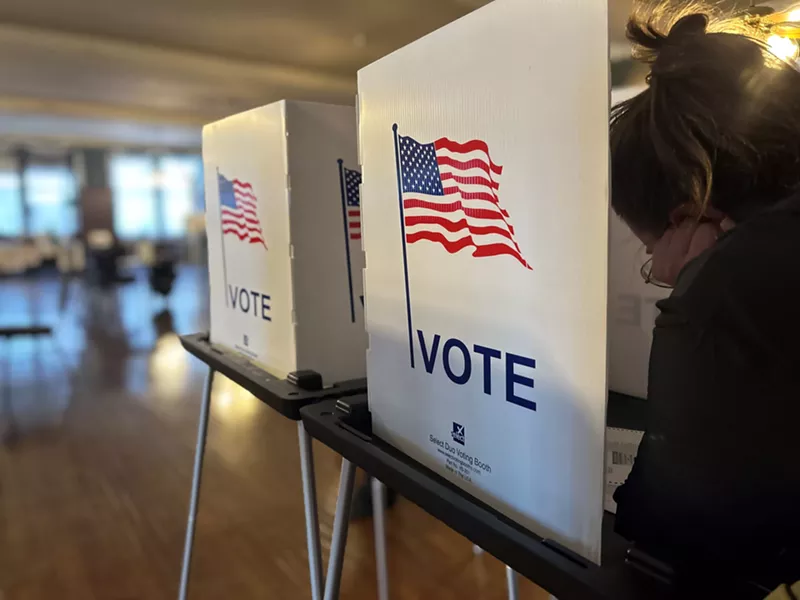Sexism and disillusionment drove Trump’s win in Michigan
No demographic had more sway over the election than men

Audio By Carbonatix
[
{
"name": "GPT - Leaderboard - Inline - Content",
"component": "35519556",
"insertPoint": "5th",
"startingPoint": "3",
"requiredCountToDisplay": "3",
"maxInsertions": 100,
"adList": [
{
"adPreset": "LeaderboardInline"
}
]
}
]

Donald Trump, a fear-mongering, convicted felon accused of sexually assaulting numerous women and inciting a violent insurrection in an attempt to overturn the 2020 presidential election, defeated Vice President Kamala Harris in Michigan, a key battleground state where he had lost by more than 154,000 votes four years ago.
Trump went on to win the overall election, defeating Harris in states that President Joe Biden won in 2020.
Now Democrats and Kamala Harris voters are asking: What the hell went wrong?
Exit polls indicate that Trump’s Michigan victory was powered by robust support from men, alongside significant gains among Latino and Arab American voters.
Trump’s win marks a notable shift in Michigan’s political landscape and reflects a broader trend seen nationwide, where Trump made gains across nearly every demographic, especially in traditionally Democratic areas. His Michigan victory was a part of a broader national success that defied expectations, leading to a strong showing in all seven battleground states and even securing the national popular vote — a first for a Republican in 20 years.
Trump was declared the winner of Michigan just before 1 p.m. Wednesday. He received 49.8% of the vote, while Harris garnered 48.3%.
Trump’s appeal cut across various demographics in Michigan, many of whom had soured on the Democratic Party. But no demographic had more sway than men, who came out strongly for Trump. About 55% of men in Michigan voted for Trump, compared to 43% for Harris, according to an exit poll conducted by Edison Research. Trump garnered even more support among white men, winning 59% of their votes, compared to 39% for Harris.
On the flipside, 53% of women voted for Harris, compared to 45% for Trump.
For women in politics, Trump’s victory was a bitter truth to confront.
Angela Rogensues, president of the Warren City Council and a delegate for the Democratic National Convention, says Trump’s victory was sexism in action.
“This is just a massive reminder of the sexism that exists systemically and how we are never good enough, no matter how much we achieve, no matter how perfect our suit is, or our pedigree or our education,” Rogensues tells Metro Times. “What do you say to little girls right now? We would rather have a 78-year-old convicted felon who has a history of sexually assaulting women?”
But Rogensues is not giving up on a better future for women. The election, she says, will galvanize women in ways the U.S. hasn’t seen in a long time.
“Like so many things, women will save the day, and you will see a movement that you haven’t seen in this country since women’s suffrage,” Rogensues says. “As women, we have to continue running for office and creating space and mechanisms for women to run. That will be my charge over the next two years. I will dig in even further to make sure that more women have seats at the table.”
Another factor in Trump’s success in Michigan was his rising and previously unthinkable popularity among Arab Americans and Hispanics. Only 39% of Hispanics voted for Harris in Michigan, compared to 58% for Trump, who has called for rounding up undocumented immigrants.
The Trump campaign heavily courted Arab American voters in Dearborn and Hamtramck, two cities with the highest concentration of Arab Americans in the U.S.
In Dearborn, where about 55% of residents are of Middle Eastern descent, Trump won with 42.5% of the vote over Harris, who received 36.3%. Green Party candidate Jill Stein collected 18.4% of the vote.
By contrast, Biden easily won Dearborn in November 2020, receiving 68.8% of the votes.
Trump also secured a victory in Dearborn Heights, where 39% of residents are of Middle Eastern descent, defeating Harris with 44% of the vote to her 38.3%, while Stein received 15.1%.
Trump also made significant gains in Hamtramck. While he lost in the city 42.7% to 46.2%, he performed better than he did in 2020, when he only received 13.4% of the vote. Biden won Hamtramck with 85.4% of the vote.
Hamtramck Mayor Amer Ghalib, who is Muslim, endorsed Trump in September.
Many Arab Americans and Muslims had pledged to vote against Harris because of the Biden administration’s refusal to pressure Israel to stop attacking Palestinians.
In a statement Wednesday morning, the Council on American-Islamic Relations (CAIR), the nation’s largest Muslim civil rights and advocacy group, said the election should serve as a warning to Democrats who refused to protect innocent Palestinians.
“It is important for Democratic and other elected officials to recognize that Vice President Harris’ steep drop in support in key states compared to President Biden's 2020 victory resulted, in part, from the deep frustration and disillusionment that many young, Muslim, Arab, Black, and other voters feel with the Biden-Harris administration due to its steadfast financial and military support for Israel’s ongoing genocide in Gaza,” CAIR National Executive Director Nihad Awad said. “The vice president's failure to lay out any plan to end that genocide, such as suspending weapons to Israel, combined with her refusal to let any Palestinian-American speak at the DNC and her embrace of the war criminal enthusiast Liz Cheney, made matters worse.”
But even if Harris performed as well as Biden did in Hamtramck and Dearborn in 2020, those cities had nowhere near enough voters — a little more than 50,000 went to the polls — to change the outcome of the election.
In Detroit, the state’s largest Democratic stronghold, Trump performed much better than he did in 2020. He received 19,667 votes on Tuesday, compared to just 12,889 in 2020. Still, Harris defeated Trump in Detroit 90% to 8%, but she received 19,307 fewer votes than Biden did in 2020.
For progressives, Tuesday marked a significant and unfortunate shift in politics – a movement that chose fear over equality.
Members of the LGBTQ+ community and their allies are increasingly worried about how this could impact the progress of inclusive policies and the fight against anti-LGBTQ+ bills.
“For decades, LGBTQ+ people have been relentlessly targeted, with recent attacks growing more dehumanizing and fueling increased violence and cruel stereotypes,” Erin Knott, executive director of Equality Michigan, said. “With this shift in our state and local governments, it is even more critical that we unite to protect LGBTQ+ Michiganders, fight against policies that harm them, and ensure the progress we’ve fought so hard to achieve is not undone.”
Democrats also lost the state House in Michigan, and that’s concerning for the LGBTQ+ community. In 2023, more than 500 anti-LGBTQ+ bills were proposed in state legislatures, including bathroom, sports and book bans.
“I know our community will be resilient, and not complacent in the face of this challenging climate,” Emme Zanotti, director of advocacy and civic engagement for Equality Michigan, said. “This might feel new after a couple of good years, but it’s actually far from it. We’ve climbed higher mountains as a movement. Now more than ever, we must double down on our efforts and investment in this fight. We only lose if we give up, and those who oppose equality better brace themselves because we aren’t giving up.”
House Speaker Joe Tate, a Democrat, said Tuesday was a wakeup call.
“Make no mistake. The results of the election represent an opportunity to regroup and rebuild over the coming term,” Tate said. “House Democrats will put in the work to regain our majority and deliver a brighter future for the millions of residents who make Michigan their home.”
Despite the big losses, there were bright spots for Michigan Democrats.
Kyra Harris Bolden and Kimberly Thomas have secured victories for two seats on the Michigan Supreme Court, strengthening the Democratic majority on the state’s highest judicial body. The victories give Democrats a 5-2 majority on the court.
With more than 95% of the votes counted, U.S. Rep. Elissa Slotkin, a Democrat, held a razor-thin lead over Mike Rogers, a Republican and former critic of Trump who later embraced him.
U.S. Rep. Rashida Tlaib, a progressive Democrat from Detroit, trounced her Republican opponent James Hooper with nearly 70% of the vote.






